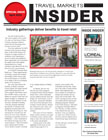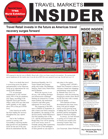John Gallagher reports.
Since Mauricio Macri, the Centrist-leaning Mayor of the city of Buenos Aires, won Argentina’s second-round runoff election on November 22nd to become the country’s next president, Argentines have been expecting major changes in fiscal and business regulations, including steps to improve relations with foreign creditors and the U.S.
Macri narrowly won with 51.4% of the vote. But this was enough to defeat Daniel Scioli, the heir apparent of outgoing Peronist president, Cristina Fernández de Kirchner, whose populist policies have propelled the country into ever deeper financial crises.
Less than a week since taking office, Macri has started to reverse the currency controls, trade restrictions and subsidies implemented by his predecessor, reports Bloomberg.
Of most interest to travel retail, Alfonso Prat Gay, the new Finance Minister of the Macri government, announced the end of restrictions to buy or sell dollars.
Anyone can now buy or sell without getting permission from the AFIP, the government Tax Office. People making cash settlements as opposed to bank debits will be charged a 5% surcharge. The daily limit, which previously was capped at $2,000 and needed the permission of the tax authorities, is now $2 million and no prior permission is required.
There will be only one exchange rate, compared to the three or four that have existed during the past few years, and that rate will be a free float with the financial markets dictating the value of the Argentine Peso. It looks like the market will open at around 14.3 / 14.5 compared to 9.7/ 9.8 yesterday.
There is now a political debate as to whether this is a devaluation or a free float to reach the true market value of the dollar.
The 35% surcharge to international air tickets and to the use of credit cards abroad will also be removed as of Dec. 17.
Importers will be able to freely import, paying the corresponding excise taxes.
It is generally believed that the four years of restrictions have not done anything to improve the economic situation in Argentina.
Duty free stores in Argentine territory had benefited from local residents using their credit cards at official exchange rates with no surcharge and with foreign tourists exchanging cash in the black market to use in the stores. These advantages disappear when the foreign exchange markets return to one single exchange rate.









